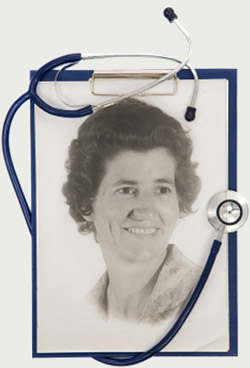
Predicting your risk of disease by looking at your family history
Posted in General Health & Wellness on June 15, 2011. Last modified on April 21, 2019. Read disclaimer.
You've probably heard the old expression, "You can't pick your relatives." And unfortunately, you can't pick your family's health history, either. But, if you know which conditions run in your family, you can change certain lifestyle habits that may put you at even higher risk, and be proactive with screening tests for early detection.
To find out your family's medical history, The Centers for Disease Control and Prevention recommends asking questions, talking at family gatherings and looking at death certificates and family medical records, if possible. You will want to collect the following information from your family (including grandparents, parents, siblings, aunts, uncles, cousins, nieces and nephews):
- Major medical conditions and causes of death
- Age of disease onset and age at death
- Ethnic background
+ Free Shipping & Returns on Eligible Items.
(*Amazon's Top 100 list updated hourly.)
The U.S. Surgeon General, with the cooperation of the U.S. Department of Health and Human Services, provides a tool that helps you easily organize your family medical history. This web-based Family Health Portrait allows you to collect the information and print it out for yourself and your healthcare provider.
When you share your family history information with your health care provider, he or she can make better decisions about your personal health care approach: determine which screening tests should be administered early and advise you on preventive measures.
Assessing your risk of developing diabetes or heart disease
A family history of conditions such as diabetes and heart disease can heavily influence your risk. Review the specific risk factors below; the more items that apply to you, the higher your risk. Contact your healthcare provider if you believe you are at risk for either of these diseases.
Diabetes
Evaluate these type 2 diabetes risk factors from the National Institute of Diabetes and Digestive and Kidney Diseases:- I have a parent, brother, or sister with diabetes
- I am over 45
- I am overweight
- My family background is Alaska Native, American Indian, African-American, Hispanic/Latino, Asian-American or Pacific Islander.
- I have had gestational diabetes, or I gave birth to at least one baby weighing more than 9 pounds.
- My blood pressure is 140/90 mm Hg or above, or I have been told that I have high blood pressure.
- My cholesterol levels are not normal. My HDL cholesterol is below 35 mg/dL, or my triglyceride level is above 250 mg/dL.
- I am fairly inactive. I exercise fewer than three times a week.
- On previous testing, I had impaired fasting glucose (IFG) or impaired glucose tolerance (IGT).
- I have polycystic ovary syndrome
- I have other clinical conditions associated with insulin resistance
- I have a history of cardiovascular disease
Heart disease
Review these heart disease risk factors from The National Heart, Lung and Blood Institute:- Family history of coronary artery disease: your risk increases if your father or brother was diagnosed before age 55, or if your mother or sister was diagnosed before age 65.
- High blood cholesterol and high triglyceride levels
- High blood pressure
- Diabetes and pre-diabetes
- Overweight and obesity
- Smoking
- Lack of physical exercise
- Unhealthy diet
- Stress
- Age: Risk increases for men over 45 and for women over 55 (or after menopause)

 How to prepare if you have pets and are going to have a baby
How to prepare if you have pets and are going to have a baby Tips for battling afternoon fatigue
Tips for battling afternoon fatigue Organic Gardening infographic
Organic Gardening infographic Tools for determining your risk of disease
Tools for determining your risk of disease Getting a jumpstart on spring gardening
Getting a jumpstart on spring gardening Fall gardening tips and tricks
Fall gardening tips and tricks Composting kitchen and yard scraps
Composting kitchen and yard scraps How music and laughter can effect our health
How music and laughter can effect our health Simple to build, Do It Yourself standup desk
Simple to build, Do It Yourself standup desk Steps for keeping your eyesight healthy as you age
Steps for keeping your eyesight healthy as you age Guide to growing purple sweet potatoes
Guide to growing purple sweet potatoes What's radon in the home and why should I be concerned
What's radon in the home and why should I be concerned Simple and healthy smoothie recipes
Simple and healthy smoothie recipes What you can do to keep your Immune System strong
What you can do to keep your Immune System strong Gardener's guide to growing strawberries
Gardener's guide to growing strawberries Causes of stress and how to deal with it
Causes of stress and how to deal with it Poisonous plants in your home and garden
Poisonous plants in your home and garden